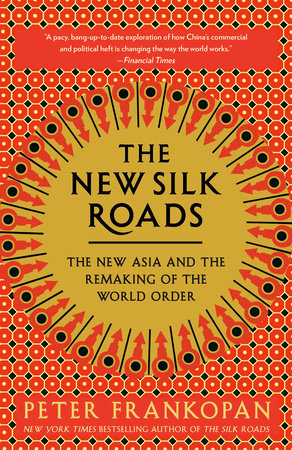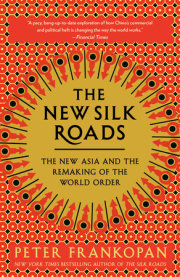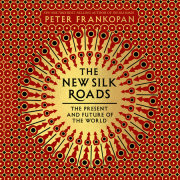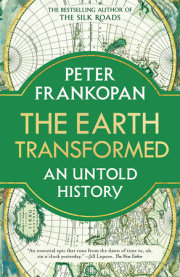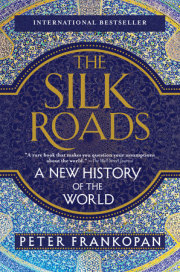The Roads to the East Twenty-five years ago, when I was about to leave university, the world seemed a different place. The Cold War was over, leading to hopes for peace and prosperity. “The heroic deeds of Boris Yeltsin and the Russian people” had steered Russia onto a course of reform and democracy, said President Bill Clinton at a meeting with the Russian president in Vancouver in 1993. The prospect of a “newly productive and prosperous Russia” was good for everyone, he noted.
Hopeful times lay ahead too in South Africa, where fraught negotiations to end apartheid had advanced sufficiently for the Nobel committee to award the Peace Prize for 1993 to F. W. de Klerk and Nelson Mandela for “their work for the peaceful termination of the apartheid regime, and for laying the foundations for a new democratic South Africa.” The award of the prestigious prize was a moment of hope for South Africa, for Africa and for the world—even if it later emerged that many of Mandela’s closest confidants urged him not to accept the prize if it meant having to share it with a man they referred to as “his oppressor.” Mandela insisted, however, that forgiveness was a vital part of reconciliation.
Things looked promising in the Korean peninsula, where, in an echo of the discussions that took place in 2018, an outline agreement was reached between the US and North Korea to great fanfare about the peaceful reunification of Korea and about a pathway for denuclearisation that was welcomed as a significant step forward for non-proliferation and also for a safer region and for a safer world.
In 1993, an important agreement was also reached between China and India that established the framework for dealing with disputed border issues that had been a source of rivalry and bitterness for three decades—while both sides also agreed to reduce troop levels along the frontier and work together towards a conclusion that was mutually acceptable. This was important for both countries at a time when economic expansion and liberalisation was at the forefront for their respective political leaders. In China, Deng Xiaoping had recently undertaken a tour of the southern provinces to press for faster social, political and financial reforms, and to deal with hardliners who opposed the liberalisation of markets that had seen the stock exchange open in communist China in Shanghai in 1990.
South Korea’s transformation was already well under way. In the 1960s, the country had been one of the poorest in the world, with no natural resources and an unpromising location at the eastern extremity of Asia. Its transformation into an economic superpower that is home to companies like Samsung, Hyundai Motor and Hanwha Corporation—each of which has more than $100bn in assets—has led some commentators to talk of South Korea as “the most successful country in the world.”
In India, as elsewhere, there was a push for growth in the early 1990s—although few expected much from a small software company that struggled to list its stock in Mumbai in February 1993. Despite its size and potential, India was an economic minnow and the technology sector was tiny and untested. Those who were brave and bought shares in Infosys Technologies did well if they held on to their stock. The company reported an operating profit for the year ended 31 March 2018 of over $2.6bn. Shares were worth turnover of more than $10bn. Shares were worth 4,000 times more than they had been twenty-five years earlier.
The foundation of a new airline in a small Gulf State seemed like a long shot, too. Founded in November 1993, Qatar Airways began operating two months later in what many assumed would be a modest operation that handled a few local routes, for which demand would be minimal. Today, the airline has a fleet of over 200 aircraft, more than 40,000 staff and flies to over 150 destinations—winning armfuls of accolades that few would have thought possible two and a half decades ago. In April 2018, it agreed to buy 25 per cent of the shares of Moscow’s Vnukovo International Airport—the third largest in Russia.
Of course, good news did not abound everywhere in 1993, as a truck bomb at the World Trade Center in New York and a coordinated series of bombings in Mumbai that killed more than 250 people showed. Sarajevo, a city already famous for the assassination of Franz Ferdinand and the road to war in 1914 endured a siege by Bosnian Serb forces that lasted longer than the Battle of Stalingrad during the Second World War. Scenes of snipers shooting at civilians as they crossed the streets became commonplace, as did terrible images of the devastation caused by mortars being fired into the city from the neighbouring hills. The reappearance of concentration camps in Europe, and of genocide at Srebrenica and Gorazde in the mid-1990s, provided a brutal reminder that even the most horrifying lessons from the past can be easily forgotten.
Some of the troubles of the early 1990s were more familiar. In Britain, for example, political discourse was shaped by poisonous debates about membership in the European Union and calls for a referendum. These almost brought down the government, and led to the prime minister, John Major, referring to members of his own cabinet as “bastards.”
*
These events are all in the recent past. And yet they now feel distant and seem to evoke a different age. I listened to an album called
Pablo Honey by a promising new band called Radiohead as I prepared for my final exams in the summer of 1993. Little did I know that the most prophetic song of the year was not “Creep”—which has gone on to have been streamed more than a quarter of a billion times on Spotify—but one that won at the Oscars that year. “A whole new world,” Aladdin promised Jasmine, “a new fantastic point of view.” Indeed, she agreed. “A whole new world, a dazzling place I never knew.” A song based on a story from and set along the past of the Silk Roads foretold its future.
That whole new world can be seen nowhere more clearly than by comparing the game of football in England in 1993 and today. A week before finals started in Cambridge, I watched a replay of the FA Cup final between Arsenal and Sheffield Wednesday, which was almost as dull and dour as the drawn first match. Of the players who featured in the match (including substitutes), all but three came from the British Isles. Twenty-five years later, the final between Chelsea and Manchester United was an equally underwhelming occasion—but the composition of the teams was radically different: just six of the twenty-seven who played at Wembley were born in the United Kingdom or Ireland. The others came from all over the world, including Spain, France, Nigeria and Ecuador.
If that tells a story about the pace of globalisation in the course of a generation, then perhaps even more striking is the dramatic change in the ownership of English football clubs over the same period. Not long ago, the idea that leading teams would have foreign owners would have been dismissed as the stuff of fantasy—at a time when even a foreign accent in the boardroom would have had club directors spluttering into their tea and choking on their pork pies at half-time. But today, many of the most famous names in English and European football have owners from abroad. And many come from the lands of the Silk Roads.
In some ways, that is not surprising. After all, although the game was codified in London in 1863, football was not invented in England. According to FIFA, the international body that governs the sport, football was first attested in Han-dynasty China (206 bc–ad 220), where a game that involved players kicking a leather ball filled with feathers into a net held up by two bamboo rods was known as
cuju.
Even so, it is a long way to go from the origins of the game to noting that all the great teams from in and around Birmingham—including Aston Villa, West Bromwich Albion, Birmingham City and Wolverhampton Wanderers—have been bought by Chinese owners since
The Silk Roads was published in 2015. In 2017, meanwhile, two of the giants of Italian football that share the magnificent San Siro stadium— AC and Inter Milan—were also sold to Chinese buyers.
Then there are the owners of England’s—and Europe’s—finest teams who come from the Gulf. Manchester City, who dominated all domestic competition to win the English Premier League in 2018 by a record margin, are owned by Mansour bin Zayed al Nayhan, who is also deputy prime minister of the United Arab Emirates. The team has a parallel in Paris Saint-Germain, who strolled to the French Ligue 1 title in the same year with equal ease, and whose Qatari owners were able to provide the team with two new players—Neymar and Kylian Mbappé—by signing them the previous summer for transfer fees that exceeded more than €350m (before salaries and bonuses).
Everton FC’s majority owner is Farhad Moshiri, who was born in Iran but now lives in Monaco, who made his fortune working alongside Alisher Usmanov, a businessman from Uzbekistan, whose investments in Russia, Central Asia and elsewhere have made him worth more than $15bn—and enabled him to buy a significant stake in Arsenal Football Club. For a time, Usmanov wanted to buy control, but was thwarted by the complex shareholder structure. Arsenal fans had pleaded with him not to sell his shares before he finally disposed of them in the summer of 2018. But for years, the fate of a proud and famous football club hung on the decision of an Uzbek magnate.
Once upon a time, rich Englishmen would head to Europe as part of the Grand Tour, frolicking in cities like Venice, Naples, Florence and Rome, admiring and being inspired by their art and architecture, and with some buying up paintings, drawings, sculptures, manuscripts and even entire contents of houses to take home with them. These were the spoils of the rising wealth and commercial and military success that turned a small island in the North Atlantic into a global superpower. Now the trophies to show off are the World Cup football tournament, successfully bid for by Russia and Qatar, the Winter Olympics (held at Sochi in 2014) and magnificent art galleries—such as the new Louvre, located not in Paris but Abu Dhabi, or the new V&A museum that is not in London’s Albertopolis but in Shenzhen. Then there is the stunning Rem Koolhaas-designed Garage Museum of Modern Art in Moscow, or the Winter Sports Complex in Ashgabat, Turkmenistan, a venue that is considerably bigger than Madison Square Garden.
In the eighteenth century, one British traveller set off on his journey to Italy “being impatiently desirous of viewing a country so famous in history, which once gave laws to the world.” Today that has changed, and now it is Britain’s history that has come to be admired, its laws and its courts used to settle disputes and agree divorce settlements, and its trophies hunted and bought by the new great and good—such as football clubs or statement assets like world-famous flagship stores Harrods and Hamleys, Canary Wharf, “the Walkie-Talkie” building at 20 Fenchurch Street in the City, or media outlets like the
Independent and the
Evening Standard, all of which have owners with Chinese, Russian or Emirati backgrounds.
It is the same story in the United States, where the Brooklyn Nets basketball franchise, the
New York Post, the Waldorf Astoria and the Plaza Hotel in New York, and Warner Music are just some of the flagship businesses and brands that have been bought outright or as partnerships by investors both from and with close links to Russia, the Middle East and China.
These also include, as it happens, Legendary Entertainment, the Hollywood studio behind
Jurassic Park, which was the box-office smash of the summer of 1993—and one of the rewards I enjoyed after finishing my exams. That is now part of Wang Jianlin’s Dalian Wanda Group Company—which also owns the Odeon, UCI, Carmike and Hoyts cinema chains in Europe, the US and Australia (with a total of more than 14,000 screens), as well as Sunseeker yachts and Infront Sports and Media—which holds the exclusive broadcast rights to sporting events that include the 2018 and 2022 football World Cup.
Naturally, while some of these businesses might qualify as hobbies and passions to be indulged, many represent serious as well as big-ticket investments. They are based on a great movement of global GDP over the last twenty-five years, with more than 800 million being lifted above the poverty line since the 1980s in China alone. While the setting of what constitutes “poverty” is a matter of debate for development economists and others, there can be little doubt that the pace as well as the extent of China’s growth is astonishing. In 2001, China’s GDP was 39 per cent of that of the US (on a purchasing power parity); that rose to 62 per cent by 2008. By 2016, China’s GDP was 114 per cent that of the United States, measured on the same basis—and is likely to rise both further and sharply in the next five years.
Copyright © 2019 by Peter Frankopan. All rights reserved. No part of this excerpt may be reproduced or reprinted without permission in writing from the publisher.

